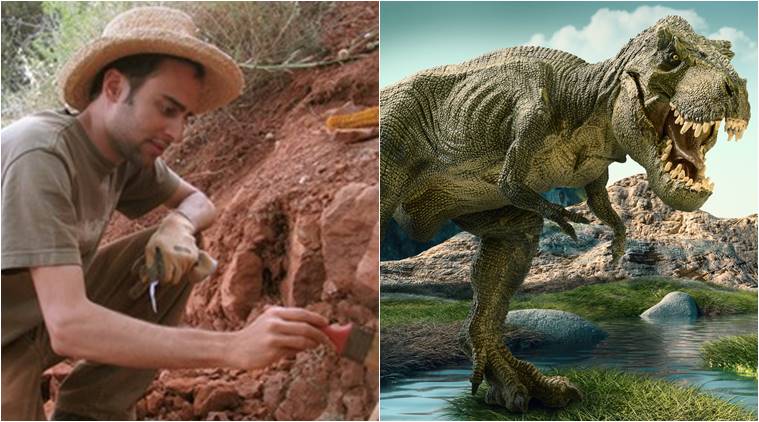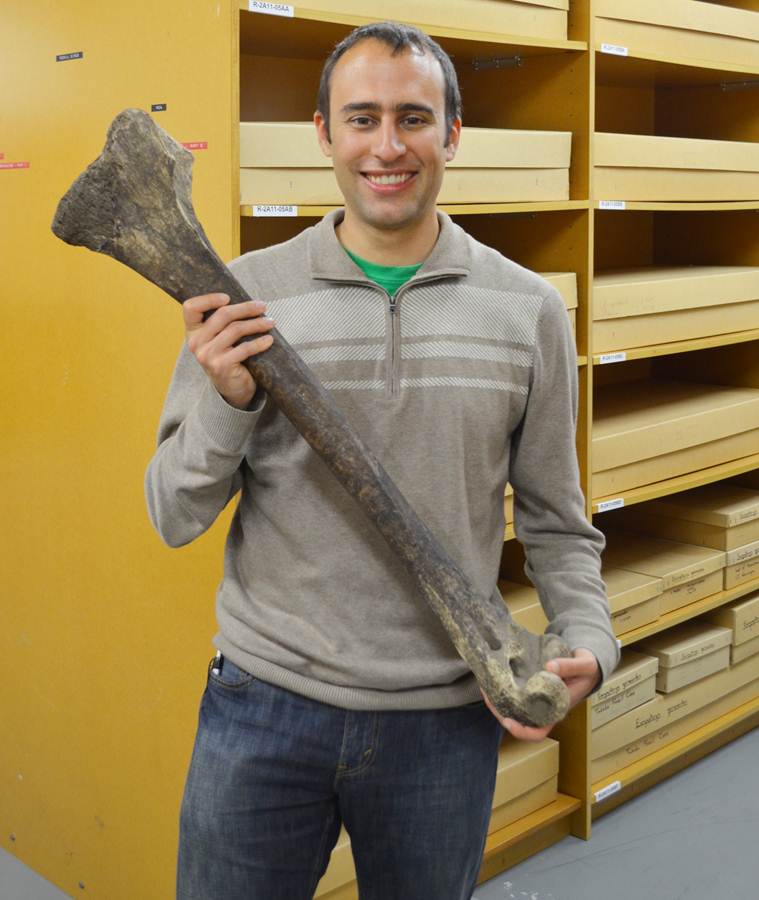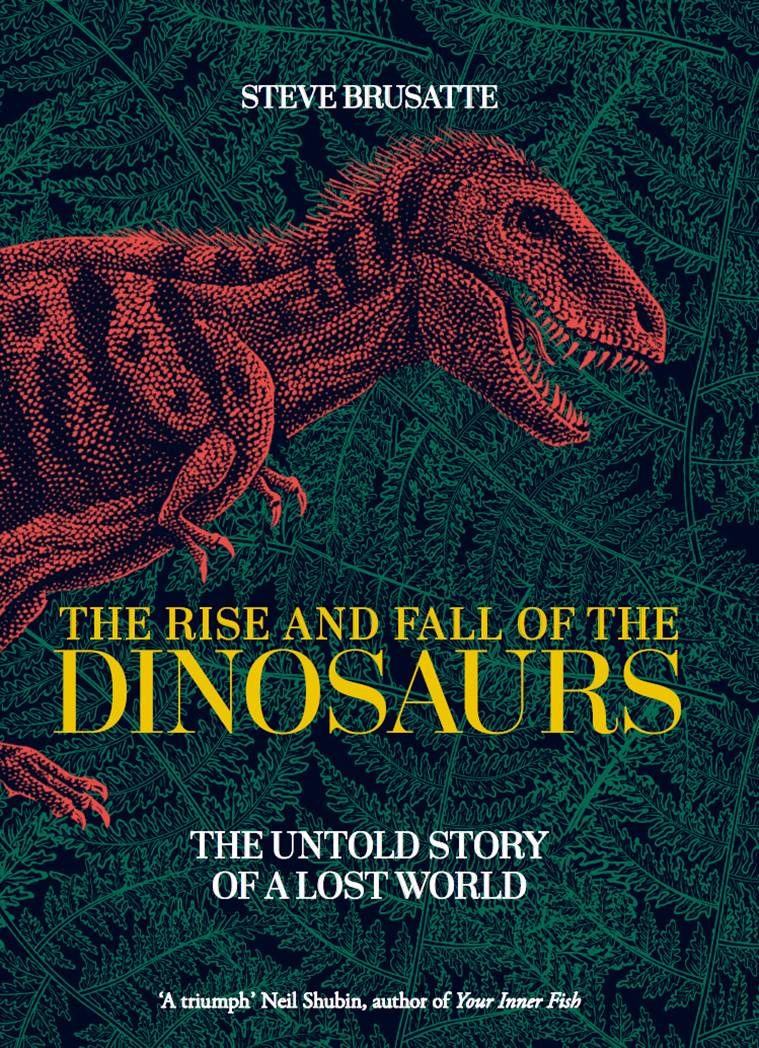Supervolcanoes were erupting in India around the same time the asteroid hit: Palaeontologist Steve Brusatte on dinosaur extinction
Steve Brusatte talks about his latest book 'The Rise and Fall of the Dinosaurs: The Untold Story of a Lost World', what being a palaeontologist entails, the currently accepted cause of dinosaur extinction, and more.

Steve Brusatte’s book ‘The Rise and Fall of the Dinosaurs: The Untold Story of a Lost World’ chronicles the evolution of dinosaurs. (Source: Wikimedia Commons, Getty Images)
Jurassic Park, it is often said, changed palaeontology forever. The Steven Spielberg blockbuster featured a hero who was a significant departure from the norm. He was not a gun-toting, pugnacious, overly muscular man but a clumsy palaeontologist who was able to plough through an entire army of T-Rexes. Sam Neill’s Dr Alan Grant was a scholar who was so besotted with seeking out new dinosaur fossils that he did not know how to fasten a seat belt. The only weapon he carried was knowledge — about dinosaurs. And in Jurassic Park, a place where these genetically recreated prehistoric beasts were let loose, that knowledge proved crucial.
Jurassic Park was not just a humongous box office success, it also made the field of palaeontology cool. The kids who watched it were absolutely fascinated by the awe-inspiring depiction of dinosaurs in the film and how Dr Grant used his dinosaur knowledge to protect the kids and eventually helped evacuate the survivors at the end of the film.
Many of those kids grew up to be palaeontologists and went on to contribute to our understanding of dinosaurs. One of them is Steve Brusatte, a palaeontologist and research scholar at University of Edinburgh’s School of Geosciences. Possessed with a childlike obsession with digging dinosaurs fossils, Brusatte is an American native and when he is not travelling to faraway places like China and Mexico to hunt for native dinosaur species, he can be found teaching.
His latest book ‘The Rise and Fall of the Dinosaurs: The Untold Story of a Lost World’ which has garnered rave reviews chronicles the evolution of dinosaurs. It begins with ancestral dinosauromorphs in the Triassic Period, continues on to the Jurassic Period with the gigantic T-Rexes in the Cretaceous Period and ends with their mass extinction. Unlike other dry, scholarly and jargon-suffused accounts, the book reads like an engrossing tale, with a definitive beginning and a denouement. Brusatte interacted with indianexpress.com over email about his book, what being a palaeontologist entails, the currently accepted cause of dinosaurs’ extinction, and more.
Excerpt:
In your book ‘The Rise and Fall of the Dinosaurs: The Untold Story of a Lost World’, the writing is surprisingly vivid and although very informative, it does not read like those boring dinosaur books that probably only other palaeontologists can read. Was this a deliberate decision to keep it more accessible?
Thank you very much! I am so happy to hear that. I tried to make the book accessible. I wanted it to be a book that anybody could read and enjoy, even if you know nothing about dinosaurs. A few years ago I wrote an academic textbook, which was fun. But this book, I wanted it to be as far from a textbook or a dry academic book as possible.
When did you collect your first fossil? How was the experience?
I grew up in Illinois, United States. Nobody has EVER found a dinosaur fossil in Illinois. It is one of my dreams to find the first dinosaur there. But there are other fossils: corals, clams, and other creatures that lived in the ocean, hundreds of millions of years before the dinosaurs. These were the first fossils I collected, when I was 14 or 15 years old. I was an awkward teenager and finding fossils took me to another world. It was amazing to imagine my home state to be covered by tropical waters so long ago.
What does a typical day in the life of a palaeontologist look like? Are you guys always digging up dinosaur fossils?
Every day is different. Sometimes we are out in the field looking for fossils or digging up dinosaurs. But probably only for one or two months of the year at most. The rest of the year I am teaching undergraduate courses, mentoring graduate students, running my lab, writing grants, doing university administration, writing books, doing public lectures and other outreach. I love my job! Every day I have the possibility of waking up and learning something new about the world, which is just so cool.
Who has been your role model?
I know it sounds lame, but my parents. I have great parents. They did everything possible to support my love of dinosaurs when I was a teenager.
If a school kid today wants to be a palaeontologist, which subjects should she or he focus on?
Take every possible science course at school. Maths as well. But don’t forget about writing and language. Good scientists need to be able to communicate their discoveries!
What is this thing about dinosaurs that is so fascinating in your opinion? There is a mythical sort of quality attached to them.
To me, if you stand underneath the skeleton of a T-Rex or a Brontosaurus, it is an awesome experience. These animals are so much more fantastic than dragons, unicorns, sea monsters, or other creatures that humans have created in myths and legends. But dinosaurs were real!
What is the dominant theory as to how dinosaurs went extinct? Was it one big apocalypse or a series of events?
I’m pretty confident it was a big sudden apocalypse. 66 million years ago, a six-mile-wide asteroid smashed into the Earth. It was travelling faster than a bullet, and impacted with the force of over a billion nuclear bombs, and punched a hole in the crust more than 100 miles wide. It immediately triggered a cascade of earthquakes, wildfires, tsunamis, and other destruction that reshaped the Earth. The dinosaurs couldn’t handle it…except for a few species of birds! But there is one other possible reason that could have contributed to the extinction. Around the same time the asteroid hit, there were huge volcanoes erupting in India. Supervolcanoes, they are called the Deccan Traps. They may have made the effects of the asteroid even worse!
For all the latest Lifestyle News, download Indian Express App
© IE Online Media Services Pvt Ltd






















 “Sometimes we are out in the field looking for fossils or digging up dinosaurs. But probably only for one or two months of the year at most.”
“Sometimes we are out in the field looking for fossils or digging up dinosaurs. But probably only for one or two months of the year at most.” The Rise and Fall of the Dinosaurs reads like an engrossing tale, with a definitive beginning and a denouement.
The Rise and Fall of the Dinosaurs reads like an engrossing tale, with a definitive beginning and a denouement.
No hay comentarios:
Publicar un comentario